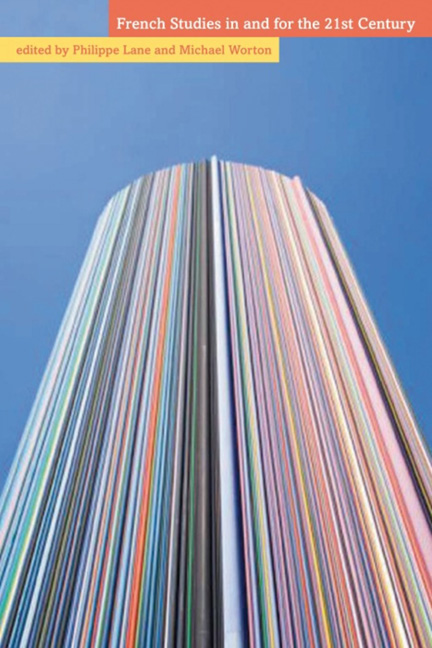Book contents
- Frontmatter
- Contents
- Notes on Contributors
- Foreword
- Foreword by His Excellency
- Part I: Contextualisations
- Part II: Research and Public Engagement Strategies
- Part III: The Place of Women and Gender in French Studies
- Part IV: The Place of Literature
- 9 Integrated Learning: Teaching Literature in French
- 10 Oxford, Theatre and Quarrels
- 11 Defining (or Redefining) Priorities in the Curriculum when the Good Times have Flown
- Part V: The Place of Linguistics in French Studies Today
- Part VI: Theatre, Cinema and Popular Culture
- Part VII: Area Studies, Postcolonial Studies and War and Culture Studies
- Part VIII: Adventures in Language Teaching
- Appendices. Addresses to the Future of French Studies Conference
9 - Integrated Learning: Teaching Literature in French
from Part IV: The Place of Literature
- Frontmatter
- Contents
- Notes on Contributors
- Foreword
- Foreword by His Excellency
- Part I: Contextualisations
- Part II: Research and Public Engagement Strategies
- Part III: The Place of Women and Gender in French Studies
- Part IV: The Place of Literature
- 9 Integrated Learning: Teaching Literature in French
- 10 Oxford, Theatre and Quarrels
- 11 Defining (or Redefining) Priorities in the Curriculum when the Good Times have Flown
- Part V: The Place of Linguistics in French Studies Today
- Part VI: Theatre, Cinema and Popular Culture
- Part VII: Area Studies, Postcolonial Studies and War and Culture Studies
- Part VIII: Adventures in Language Teaching
- Appendices. Addresses to the Future of French Studies Conference
Summary
Initially we were to contribute separate chapters to this collection, one on pre-modern French Studies, another on the place of literature in French Studies today. We decided, however, to write this piece together in the belief that the two questions are intimately related, on several levels (at least for UK universities, on which we shall focus). In practice, pre-modern studies in university French programmes are to a significant extent literary studies; and such pressures as exist to move away from pre-modern areas are closely linked to wider pressures to move away from literature of any era. Much of this chapter is concerned with the sources of pressure, which are multiple and sometimes murky. To put it more positively, though, we want to suggest that there are still good reasons to study French/francophone literature, and that the reasons for studying contemporary francophone film, say, are fundamentally similar to the reasons for studying medieval poetry.
According to survey results reported in Michael Worton's 2009 Review of Modern Foreign Languages Provision in Higher Education in England, undertaken for HEFCE, ‘By far the most widely-reported trend was a move towards a greater emphasis on contemporary cultural studies – including film studies, contemporary literature and “area studies” ’. Trends in teaching and research are closely linked and the RAE 2008 Sub-panel Overview Report for French noted that: ‘The relatively low numbers of specialists in the fields of linguistics, medieval studies, Renaissance and seventeenth-century studies continue to be a cause of concern.’ The report expressed regret that ‘appointments seem to be failing to keep pace with retirements’ for the medieval period, that although ‘the demographic reduction of the French Renaissance, noted in 2001, has stabilised’, nonetheless, ‘fewer than 20 national departments submitting to the 2008 French sub-panel have Renaissance specialists’, and that for the seventeenth century ‘even some large departments are without a specialist’. This chapter airs some possible reasons for this trend.
- Type
- Chapter
- Information
- French Studies in and for the 21st Century , pp. 107 - 117Publisher: Liverpool University PressPrint publication year: 2011



